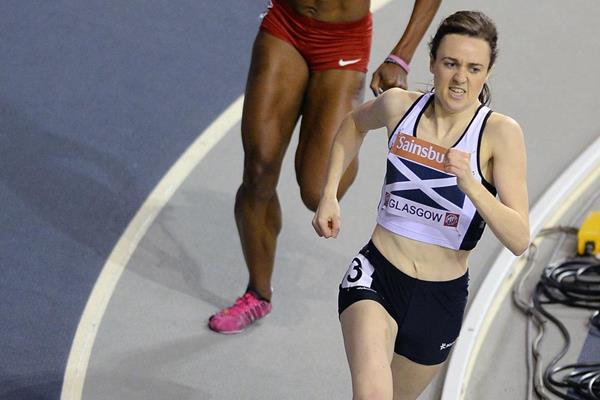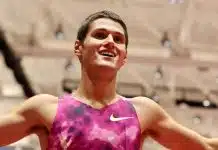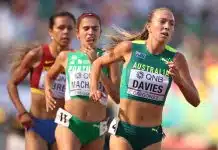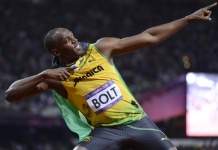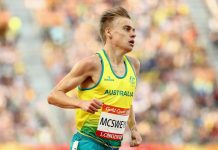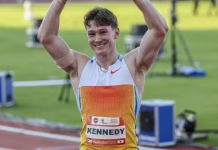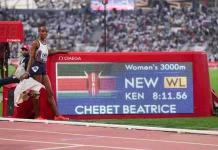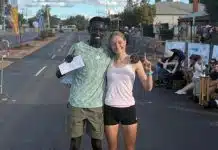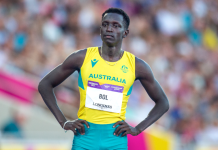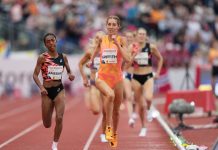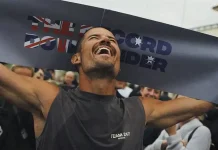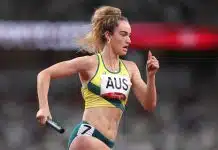By David Monti, @d9monti
(c) 2017 Race Results Weekly, all rights reserved
BELGRADE (05-Mar) — With an explosive final 400 meters covered in just 60.41 seconds, Britain’s Laura Muir clinched her second gold medal of the 34th European Indoor Championships, winning the 3000m in a championships record of 8:35.67 here at Kombank Arena. In doing so, she became the first woman to win both the 1500m and 3000m at these championships since Poland’s Lidia Chojecka in 2007. She also became just the third British woman to win in this discipline after Yvonne Murray in 1987 and Helen Clitheroe in 2011.
Unlike her 1500m victory from yesterday, Muir took a more measured approach to today’s race. As the field of 12 women approached the 800-meter mark, her key rival, Turkey’s Yasemin Can, went to the front and picked up the pace. Muir attached herself to Can, and followed her closely through 1000m in 2:59.98 and 2000m in 5:50.98, leaving the rest of the field behind. Muir, who is not afraid to run from the front, was trying to save energy.
“Halfway through the race I was feeling a bit tired,” the tiny Scotswoman told reporters. “I was hoping she wasn’t going to ramp it up any more. I managed to hang in there, and I knew I would have the kick.”
With a little less than two laps to go, Muir showed all of her cards. She shot ahead on the backstretch, and within seconds Can was out of gold medal contention.
“I just waited until the best point and I just went for it,” declared Muir.
Can, a former Kenyan who won gold medals at last summer’s European Championships in both the 5000m and 10,000m, had to settle for second, clocking a Turkish indoor record of 8:43.46. She did not speak with the media.
Behind the top-2 finishers, a terrific battle played out for the bronze medal. Maureen Koster of the Netherlands had led the chasing group for the entire race and was well-positioned to take the bronze. But with a lap to go, Britain’s Eilish McColgan started a mad sprint to catch her. With her arms swinging furiously and her long ponytail bobbing, McColgan began to reel in Koster on the backstretch, finally passing her around the final bend. Koster, clearly exhausted, had no answer.
“I knew where the top-two medals were going and it was going to be a fight for the bronze,” McColgan explained. She continued: “I suppose that with 200 to go I knew it was my chance here: I either need to move my ass or I’m not going to get it.”
McColgan clocked 8:47.43 to Koster’s 8:48.99, a triumph for the Scotswoman but heartbreaking for Koster who was also fourth at last year’s IAAF World Indoor Championships.
“I’m so frustrated to finish in fourth,” Koster told European Athletics interviewers. “But I gave it everything I had. After three kilometers my legs were completely tight and I knew that if someone could catch up with me it would be Eilish, but I ran as hard as I could.”
The men’s 3000m wasn’t decided until the final lap. At the bell, four men –Germany’s Richard Ringer, Spain’s Adel Mechaal, Norway’s Henrik Ingebrigtsen and Azerbaijan’s Hayle Ibrahimov– were spread four-across the 6-lane track. Mechaal, last year’s European Championships 5000m silver medalist, made the first move on the backstretch, and Ingebrigtsen quickly responded. The Norwegian pulled up to the Spaniard, but with about 80 meters to go he relented, giving Mechaal the win in 8:00.60, the slowest wining time at these championships in ten years.
“I knew with only base-work, threshold and winter training I don’t have the speed to pass somebody in the last hundred,” Ingebrigtsen told Race Results Weekly after finishing second in 8:00.93. He continued: “I don’t have much speed these days.”
Mechaal was thrilled with his performance, and felt confident enough to do an interview in English.
“I am very happy because in September I changed the coach,” he said. “All years I had the good form, but never the best form was in the high competition.” He added: “I am very happy, very proud, for the job.”
Germany’s Richard Ringer landed in the bronze medal position in 8:01.01, his first medal in a European Indoor Championships.
In the women’s 800m final, Switzerland’s Selina Büchel got a fierce battle from Britain’s Shelayna Oskan-Clarke in the final lap of the race. Büchel, the defending champion, took out the race hard from the gun, covering the first 400 meters in 59.56. At the bell, Oskan-Clarke tried to get around Büchel, and the two traded a few elbows.
“She was holding her line,” Oskan-Clarke told Race Results Weekly. “I probably should have committed a bit harder to doing it, or a bit earlier. She’s a good 800-meter runner and knew to hold her line, same way I would have held my line if someone did that to me.”
Büchel had to use everything she had to hold off Oskan-Clarke in the final lap, especially in the last 20 meters when her form completely broke down from exhaustion. She got the win in a national record 2:00.38, a razor-thin margin over Oskan-Clarke’s 2:00.39, a personal best.
“It was a very difficult moment in the race,” Büchel said of the contact with Oskan-Clarke. “It was a big fight between me and Shelayna, and I’m happy to defend my position there, and that I won the race in the end.” She added: “I was empty and I was just trying to go as fast as possible.”
The fast pace up front was beneficial for Iceland’s Anita Hinriksdóttir because it stretched out the field and gave her some room to run from behind. Although chased by Sweden’s Lovisa Lindh in the final meters, she was simply too fast and clinched the bronze in 2:01.25, earning her first medal at a senior championships.
“With those big girls it’s really a lot of effort to fight in the front,” Hinriksdóttir admitted. “It turned out good. I think you almost need a little bit of luck (in the) 800, especially indoors. I’m really happy.”
The men’s 800m played out differently, with the two best athletes –Poland’s Adam Kszczot and Denmark’s Andreas Bube– running clean races, avoiding trouble and getting the gold and silver medals, respectively. Kszczot, the gold medalist from these championships in 2011 and 2013, followed Bube when the Dane went to the front at 400 meters (56.52). On the backstretch, Kszczot passed him on the outside, then led the race all the way to the finish in 1:48.87.
“I created a bit this race,” Kszczot told Race Results Weekly with a sly smile. He continued: “I was in the perfect position, one hundred meters before the final moment to hit (the bell), and I accelerated the first which makes you the winner.”
Bube, who almost didn’t get out of the first round, was clearly happy with second in 1:49.32, his first medal in a European Indoor Championships. Most of all, he was pleased with his sound tactics.
“No mistakes this time, just a nice clean race,” he said flashing a big smile. “No fighting or anything, just straight to the back, then straight to the front when I saw a good opportunity.”
Of the three Spaniards in the final –Alvaro De Arriba, Kevin López, and Daniel Andújar– it was De Arriba who would emerge with a medal after a near fall with Dutchman Thijmen Kupers with about 80 meters left in the race. The two made contact and Kupers lost all of his momentum, finishing in fifth. De Arriba finished comfortably ahead of Andújar in 1:49.68.
“If I had been told at the start of this championships that I would win bronze, I would never have believed it,” he told European Athletics interviewers.
The 35th European Indoor Championships will be held in Glasgow, Scotland, in 2019.


